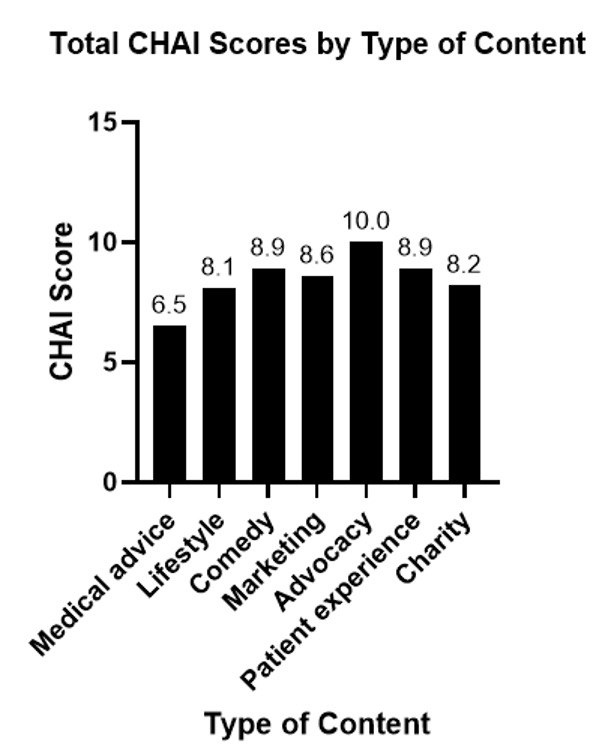Tuesday Poster Session
Category: IBD
P5299 - Reel Talk: Evaluating the Informational Landscape of Crohn’s Disease Related Instagram Videos Through a Novel Scoring System
Tuesday, October 28, 2025
10:30 AM - 4:00 PM PDT
Location: Exhibit Hall

Sankirth Madabhushi, MD (he/him/his)
University of Massachusetts Chan Medical School
Worcester, MA
Presenting Author(s)
Sankirth Madabhushi, MD1, Ami Patel, DO, MPH1, Andrew Liu, MD1, Samantha Tse-Kang, PhD1, Abbas Rupawala, MD2
1University of Massachusetts Chan Medical School, Worcester, MA; 2UMass Chan Medical School, Worcester, MA
Introduction: Amid a growing “infodemic” of health misinformation, the U.S. Surgeon General sounded the alarm in 2021 on the dangers of inaccurate medical content on social media. To our knowledge, there have been no prior studies evaluating Crohn’s disease (CD) related content on social media. We assessed the quality and accuracy of Instagram Reels containing CD related content using a novel scoring system specifically developed for social media health content.
Methods: 77 top-viewed English-language Instagram Reels tagged with “#crohns” were collected over a two-hour period. Videos were categorized by uploader and content type. Due to the absence of a validated scoring system for medical content on social media across different types of content, we developed the Content Health Accuracy Index (CHAI). The CHAI assesses health content across five domains: authorship, transparency, evidence-based accuracy, clarity, and relevance. Each domain is scored from 0-2, yielding a total score of 0-10. Scores are categorized as poor (0-3), moderate (4-7), or high quality (8-10). Two physicians independently evaluated each video.
Results: The most common videos were intended to deliver lifestyle advice (31.2%) and medical advice (20.8%). The average CHAI score across all videos was 8.1. Medical advice videos had the lowest accuracy subscore (0.5) and CHAI score (6.5). 21% of videos had an accuracy score of 0, and 44% of those were created by medical professionals. There was no significant difference in CHAI scores among videos by medical and non-medical creators. On average, non-medical creators were most likely to produce overall more inaccurate and/or harmful videos (p < 0.01). Among medical advice videos, those created by medical professionals had significantly higher CHAI scores (p < 0.01).
Discussion: The CHAI is a novel scoring system developed to assess health information quality and accuracy on social media that older tools may overlook. While the average CD reel had an overall moderate to high CHAI score, medical advice videos specifically were notably low in accuracy on average and were of moderate quality overall. Concerningly, 44% of all types of videos containing false or harmful claims in our study were created by medical professionals. Non-medical creators were significantly more likely to produce inaccurate videos about CD across all types. Our study emphasizes the need for caution and improved accountability of online health content, and offers a novel tool that may assist with this.

Figure: Overall Content Health Accuracy Index (CHAI) scores across different intended purposes of content videos. Scores ranged from highest to lowest for Advocacy (n=1), Comedy (n=4), Patient Experience (n=22), Marketing (n=7), Charity (n=3), Lifestyle (n=24), and Medical Advice (n=16)
Disclosures:
Sankirth Madabhushi indicated no relevant financial relationships.
Ami Patel indicated no relevant financial relationships.
Andrew Liu indicated no relevant financial relationships.
Samantha Tse-Kang indicated no relevant financial relationships.
Abbas Rupawala: Abbvie – Consultant, Speakers Bureau. Pfizer – Consultant. Takeda – Consultant.
Sankirth Madabhushi, MD1, Ami Patel, DO, MPH1, Andrew Liu, MD1, Samantha Tse-Kang, PhD1, Abbas Rupawala, MD2. P5299 - Reel Talk: Evaluating the Informational Landscape of Crohn’s Disease Related Instagram Videos Through a Novel Scoring System, ACG 2025 Annual Scientific Meeting Abstracts. Phoenix, AZ: American College of Gastroenterology.
1University of Massachusetts Chan Medical School, Worcester, MA; 2UMass Chan Medical School, Worcester, MA
Introduction: Amid a growing “infodemic” of health misinformation, the U.S. Surgeon General sounded the alarm in 2021 on the dangers of inaccurate medical content on social media. To our knowledge, there have been no prior studies evaluating Crohn’s disease (CD) related content on social media. We assessed the quality and accuracy of Instagram Reels containing CD related content using a novel scoring system specifically developed for social media health content.
Methods: 77 top-viewed English-language Instagram Reels tagged with “#crohns” were collected over a two-hour period. Videos were categorized by uploader and content type. Due to the absence of a validated scoring system for medical content on social media across different types of content, we developed the Content Health Accuracy Index (CHAI). The CHAI assesses health content across five domains: authorship, transparency, evidence-based accuracy, clarity, and relevance. Each domain is scored from 0-2, yielding a total score of 0-10. Scores are categorized as poor (0-3), moderate (4-7), or high quality (8-10). Two physicians independently evaluated each video.
Results: The most common videos were intended to deliver lifestyle advice (31.2%) and medical advice (20.8%). The average CHAI score across all videos was 8.1. Medical advice videos had the lowest accuracy subscore (0.5) and CHAI score (6.5). 21% of videos had an accuracy score of 0, and 44% of those were created by medical professionals. There was no significant difference in CHAI scores among videos by medical and non-medical creators. On average, non-medical creators were most likely to produce overall more inaccurate and/or harmful videos (p < 0.01). Among medical advice videos, those created by medical professionals had significantly higher CHAI scores (p < 0.01).
Discussion: The CHAI is a novel scoring system developed to assess health information quality and accuracy on social media that older tools may overlook. While the average CD reel had an overall moderate to high CHAI score, medical advice videos specifically were notably low in accuracy on average and were of moderate quality overall. Concerningly, 44% of all types of videos containing false or harmful claims in our study were created by medical professionals. Non-medical creators were significantly more likely to produce inaccurate videos about CD across all types. Our study emphasizes the need for caution and improved accountability of online health content, and offers a novel tool that may assist with this.

Figure: Overall Content Health Accuracy Index (CHAI) scores across different intended purposes of content videos. Scores ranged from highest to lowest for Advocacy (n=1), Comedy (n=4), Patient Experience (n=22), Marketing (n=7), Charity (n=3), Lifestyle (n=24), and Medical Advice (n=16)
Disclosures:
Sankirth Madabhushi indicated no relevant financial relationships.
Ami Patel indicated no relevant financial relationships.
Andrew Liu indicated no relevant financial relationships.
Samantha Tse-Kang indicated no relevant financial relationships.
Abbas Rupawala: Abbvie – Consultant, Speakers Bureau. Pfizer – Consultant. Takeda – Consultant.
Sankirth Madabhushi, MD1, Ami Patel, DO, MPH1, Andrew Liu, MD1, Samantha Tse-Kang, PhD1, Abbas Rupawala, MD2. P5299 - Reel Talk: Evaluating the Informational Landscape of Crohn’s Disease Related Instagram Videos Through a Novel Scoring System, ACG 2025 Annual Scientific Meeting Abstracts. Phoenix, AZ: American College of Gastroenterology.
